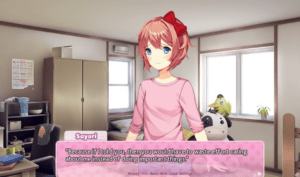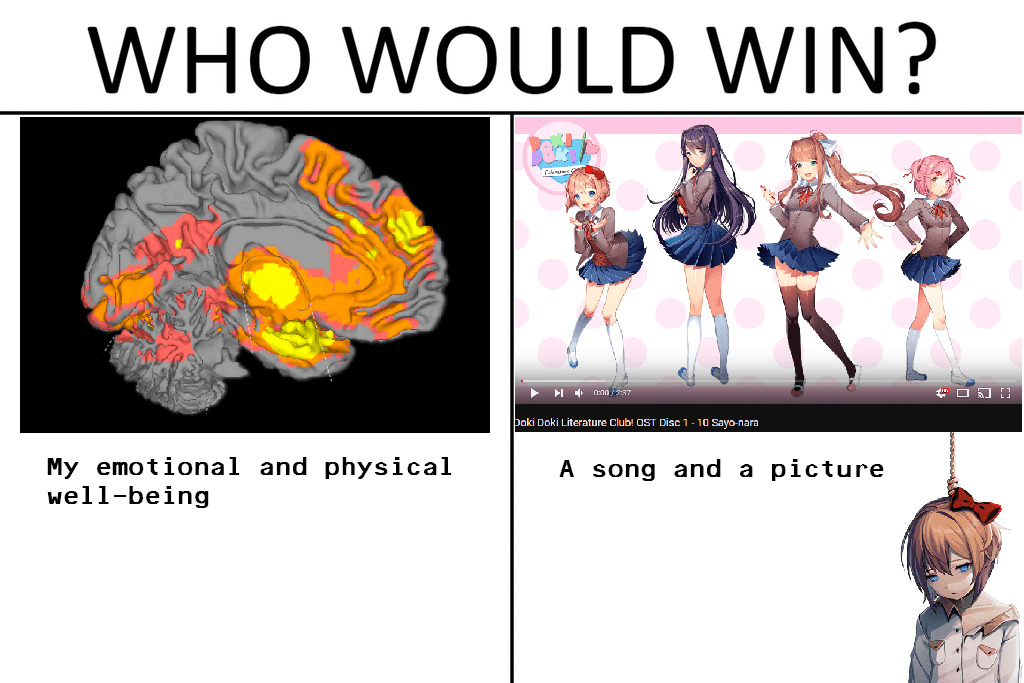For this week’s critical play, I chose Doki Doki Literature Club. I have long known about this game but due to the inklings of horror aspects I had gleaned, I had never gotten around to it. It’s a visual novel developed by Team Salvato, initially released in 2017. DDLC is meant for visual novel/dating sim enjoyers who don’t mind a darker game, as well as people who just straight up enjoy psychological horror, or simply people who ascribe to meme culture (as DDLC was quite popular on apps like Youtube for a while). The game starts as a seemingly light-hearted dating sim, where the player joins a high school literature club and interacts with four female members. However, as I had previously suspected, it soon reveals itself to be a psychological horror game that deals with themes of mental illness, depression, and even existential dread. In my opinion, playing Doki Doki Literature Club as a feminist involves examining the game’s treatment of its female characters, themes related to gender, in addition to the portrayal of mental health issues, to holistically explain its shortcomings when looked at through a feminist lens.
On the whole, I didn’t find much to be redeemable when playing DDLC as a feminist. I strongly disliked how it perpetuated female archetypes found in dating sims, such as the shy one, the childhood friend, the tsundere, and the mysterious girl. I found this remarkably objectifying, albeit not unexpected, as it reduces women from being complex individuals into simple tropes designed to cater to the player’s (usually male) desires. I also disliked how the other characters were easily controlled, whether by Monika or by myself. I felt that this was a perpetuation of how women are often deprived of agency in popular media and society, and it left a bad feeling in my stomach despite the meme-ness of the game. Something else that left me feeling uneasy in my stomach was how the game portrays severe mental health issues in a graphic and disturbing manner. As someone who suffered from depression, I would argue that this portrayal of other mental health issues trivialized these conditions or and used them as shock value, and didn’t explore them with the depth and sensitivity they deserve. I will note that Monika who becomes self-aware and ended up manipulating the game can in a way be seen as a critique of the traditional meek and submissive roles assigned to female characters in dating sims. However, in my opinion her actions also perpetuate the common media trope of the crazy woman, where though she has intelligence and self-awareness, it leads her to destructive behavior ultimately.
I do feel like DDLC can be significantly improved through a few relatively small changes that will help its shortcomings feel more like a satirical take on stereotypical female portrayal in popular media. There is potential to challenge gender stereotypes by providing more nuanced and complex representations of its characters from the start, by making them go beyond just being a stereotypical yandere or similar trope. I wanted the girls to feel more real, almost, despite them being very obviously cartoony- I felt like I would get more out of the game had it felt almost more realistic. Something that might have helped it feel this way also would be allowing the female characters more agency and the ability to affect the story’s outcome independently of the player’s choices or Monika’s manipulation. This could also help potentially align with feminist ideals of self-determination, for young female players of the game. Finally, I wish that the game could address mental health issues with greater sensitivity and depth. Providing insights intothe reality of these issues and maybe demonstrating pathways for support would be more societally productive than continuing to use these issues for shock value. When exploring Sayori’s depression, I was at first optimistic, but seeing her graphic death by suicide ruined the development of the conversation on depression, in my opinion.

In conclusion, while I did take DDLC’s shortcomings with a grain of salt as it is a meme dating sim, I wished that it more explicitly challenged and critique the norms of dating sims and the objectification of women in media, to become more solidly a satirical take on female portrayal in media, as I think it had the potential to do so but failed.



